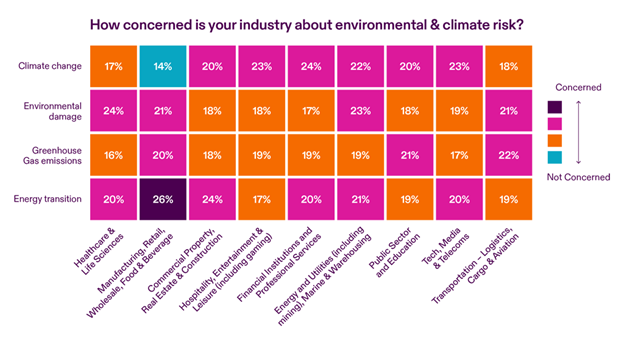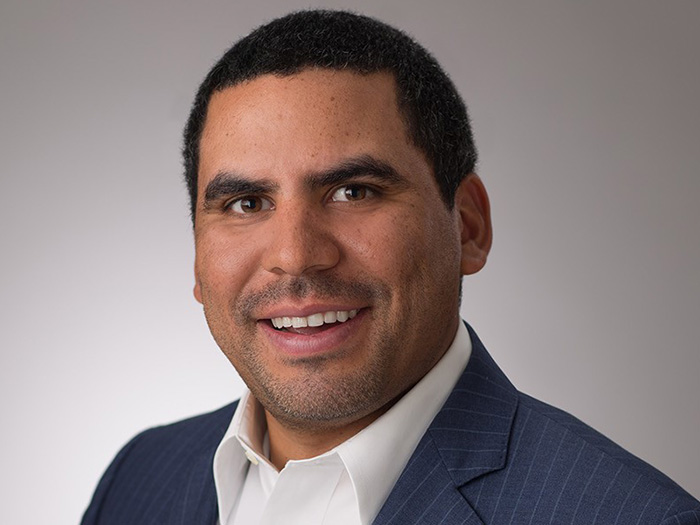Business Leaders Underestimate Climate Risks Despite Disasters

Despite escalating climate catastrophes causing widespread business disruption, only 20% of global business leaders rank climate risk as a top concern, revealing a stark disconnect between environmental reality and corporate priorities as economic uncertainty dominates executive attention, according to a survey from Beazley.
The report details how 3,500 global business leaders perceive the threat posed by four risks in particular: climate risk, the energy transition, greenhouse gas emissions and environmental damage to their operations.
Economic uncertainty is dominating executive concerns, with 26% of business leaders ranking it as their top risk for 2025—the highest level since 2022, the survey found. This focus on immediate financial pressures comes at the expense of longer-term threats like climate and catastrophic risk, despite the increasing frequency and severity of extreme weather events worldwide.
“2024 was characterized by numerous Black Swan weather events – previously once in a lifetime, they are sadly becoming the norm. But our research reveals that executives’ focus is on the uncertainties of the here and now – potentially missing the elephant in the room,” commented Paul Bantick, chief underwriting officer at Beazley.
The tension between economic priorities and sustainability goals is creating a significant challenge for businesses. Nearly three-quarters of surveyed executives acknowledge this conflict, with the survey noting, “73% believe that the current economic climate is resulting in them taking their eye off their sustainability targets and making being a sustainable business less of a priority.”
This shift in focus could have serious implications for corporate sustainability initiatives and climate resilience efforts, Beazley noted.
Energy Transition Challenges Mount
The path toward decarbonization is proving difficult for many organizations. According to the survey, 67% of executives report significant challenges in transitioning to non-carbon energy sources and meeting their net zero targets. Despite these difficulties, executive concern about energy transition risks appears to be waning, with only 21% identifying it as their top risk concern for 2025—down from 23% in 2024.
This declining concern suggests executives may be underestimating the complexities and costs associated with energy transition—a trend that has persisted since 2023, Beazley reported. However, nearly a quarter of respondents (23%) predict their concern about energy transition risks will increase again by next year, indicating growing awareness of the challenges ahead.
Despite the hesitation, there are positive signs of action. The survey reveals that 34% of organizations plan to increase their energy efficiency this year, representing a significant jump from 23% in 2024. This uptick suggests that while macroeconomic concerns may be dominating boardroom discussions, practical steps toward sustainability remain on the agenda for many businesses.
Building Resilience in a Changing Climate
Organizations are increasingly recognizing the need to adapt their risk management approaches in response to climate challenges. Survey data reveals that 72% of executives are adopting new risk management procedures specifically due to extreme weather events. This proactive stance demonstrates growing awareness of climate-related risks, even as overall concern about climate risk remains unchanged in 2025 at 20% of executives ranking it as their top concern, same as the year before, the survey found.
The insurance industry has emerged as a critical partner in helping businesses navigate the accelerating risk landscape. With their specialized expertise, insurers are providing valuable risk analysis and mapping services that enable companies to better understand their climate-related exposures, the report noted.
Technological advancements have significantly improved data analysis capabilities, creating new opportunities for understanding and addressing climate risk. These enhanced analytical tools allow forward-thinking businesses to identify potential vulnerabilities in their operations and supply chains before they materialize into costly disruptions.
“By planning for and identifying future climate risks, firms can start to build resilience to these emerging risks and be better equipped to face the future with confidence,” Bantick said.
View the full report here. &









